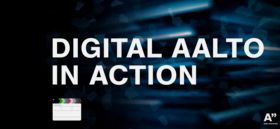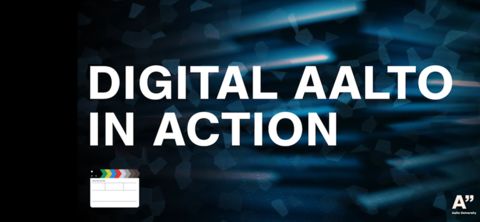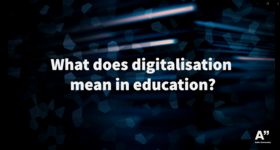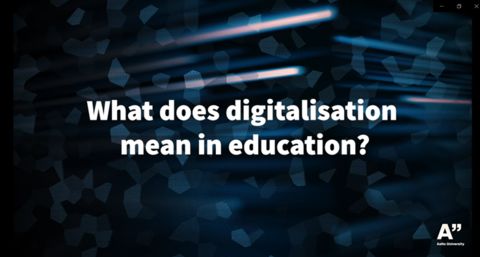Future learning will consist of flexible studies and digitally supported study experience

In the year of 2020, our teachers, students and everyone at Aalto, experienced a rapid transition to a digital working model. The transition went smoothly, as our university was already fully prepared for it thanks to the years of work of the Digital Aalto program. In the future, technology will be developed to support more flexible hybrid teaching.
‘During the pandemic, we have shown that we have done the right things and that all Aalto community members have the necessary digital skills and abilities’, says Kati Hagros, Aalto's Chief Digital Officer.
Already, 90 percent of courses can be completed remotely using existing platforms and support. Only some laboratory and workshop courses do not include digital components. In addition, 80 percent of exams can already be held digitally. The work done towards digitalisation has also been visible to students, as based on opinion polls, most Aalto University students have so far been satisfied with the development of technology.
Furthermore, it is important to constantly develop things. For example, remote learning brings new kinds of challenges from the experience of participation and community. At the moment, the university is considering solutions on how to improve the study experience of distance participants and how hybrid teaching will be organized in the future.
Learning for the future utilizes the hybrid model and brings flexibility to studies
Hybrid capability refers to a teaching model in which teaching takes place both online and on campus. In just over 50 of the teaching facilities in Aalto, simultaneous hybrid readiness already exists. The facilities will be renovated and plans for the AV modernization of the next more than 60 facilities already exist. When teaching is slowly transferred back to campus, for the sake of technology, it is also possible to follow the teaching remotely and the lectures can be recorded for later use.
In the future, the digitalisation of studies will mean more flexible studies, a digitally supported study experience and greater utilization of data and analytics. We are constantly monitoring new innovative teaching tools and developing course offerings and teaching facilities to be flexible and suitable for different situations.
‘In line with our new strategy, we have new needs and ideas on how digitalisation can support student success, innovation and creativity in the future. We learn from current experiences and develop the best possible new hybrid work models for Aalto’, says Kati Hagros.
Follow a video series about Aalto University's digitalisation journey
With this video series you can follow Aalto University's digitalisation journey from different aspects. The first part of the series provides an overview of digitalisation and asks experts how digitalisation can be used to support university-wide themes, including sustainability, creativity and an entrepreneurial mindset. The following episodes focus on digitalisation in education, research, and creating impact. So stay tuned!
Digital Aalto
Digital Aalto is a university-level strategic initiative that helps us shape a sustainable future.
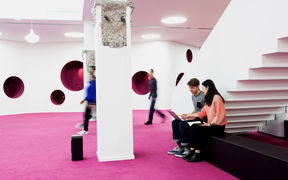
Read more news

Apply Now: Unite! Visiting Professorships at TU Graz
TU Graz, Austria, invites experienced postdoctoral researchers to apply for two fully funded visiting professorships. The deadline for expressions of interest is 20 February 2026, and the positions will begin on 1 October 2026.
Elina Pyylampi wants to combine renewable energy solutions and commerciality
The first-year student in Electrical Power and Energy Engineering wants to work with renewable energy and electrical systems.
Stop applying for jobs and build your own startup instead at Ignite
Applications for the Ignite summer accelerator program 2026 are open. Apply by March 8.







